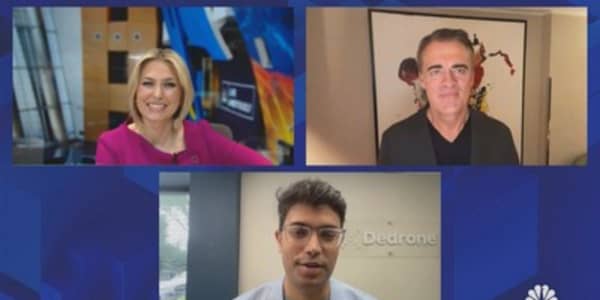Out of nowhere in July 2016, Pokémon Go became perhaps the most unique, if not the biggest-ever, hit in mobile gaming, eventually hitting 600 million total downloads and bringing in more than $2.5 billion in revenue. Its successor is soon to try and repeat the magic in the world of Muggles: Harry Potter: Wizards Unite.
Its release later this year will test the ability of the game's maker, Niantic, and its augmented reality and geolocation-based gaming technology to do something twice that no gaming company has ever accomplished: Get people not just off the couch but out of the house.
Instead of staying glued to screens, the global mystery game — which will launch in 19 languages — will let players explore real-world surroundings, cast spells, and encounter fantastic beasts and iconic characters from the Harry Potter films along the way. It is an idea Niantic CEO John Hanke refers to as "real-world social."
I.e. "old-world" social.
"We want to get people out and about and find out more about their world through exploration and discovery," said Niantic's chief marketing officer, Mike Quigley.
He said that every Niantic project is built on three ideas: exploration, exercise, and real-world social: "Get together in the world and have real human interaction."
Hanke was motivated to create games that promote physical movement when he saw technology's sedentary effects on his own children's generation. Eighty-five percent of Pokémon Go and Harry Potter: Wizards Unite gameplay require the user to be outside.
Niantic, which ranked No. 38 on the 2019 CNBC Disruptor 50 list, was formed nine years ago as a start-up inside of Google called Niantic Labs and was spun out in 2015 with investments from Google, The Pokémon Company, and Nintendo, when Google reorganized under new parent Alphabet.
The new game is a joint development with AT&T-owned Warner Bros. Interactive Entertainment, and will be part of the WB label Portkey Games, which is dedicated to content from J.K. Rowling's Wizarding World.
If Niantic can apply the same strategy and techniques to Harry Potter: Wizards Unite, we could see another wildly successful project.Carl LivieAppLovin managing director for Europe
Total gross player spend in Pokémon Go since launch in July 2016 stands at $2.54 billion on approximately 556 million unique installs, according to mobile research firm Sensor Tower. Niantic says the game has surpassed 1 billion downloads. While the game reached its peak revenue of $200 million in August 2016, it has had a long tail: almost 150 million users three years after its release, according to a recent SuperData report.
It also just had a massive month in April, as players spent more than $65 million worldwide in the game, an increase of 15 percent year-over-year, according to Sensor Tower. So far in 2019, the game has grossed $291 million, up 29% year over year and putting the game on track for more than $1 billion worldwide this year.
"The developer appears to have developed a winning formula for this title that we expect will maintain its trajectory well into 2020. This strategy will no doubt be employed in Harry Potter: Wizards Unite to draw upon that franchise's deep cache of content and characters to build a similar roadmap for the title stretching far beyond its initial release," said Sensor Tower co-founder Alex Malafeev.
Gaming market analysts say one hurdle for Harry Potter is, surprisingly, popularity.
"Pokémon has more Google search traffic, making it a bigger IP (especially in markets like Japan)," said Carter Rogers, principal analyst at SuperData, a Nielsen Company. He said the success of the Harry Potter game will depend on whether its richer gameplay and updated technology can overcome the obstacle of using a less popular title, and added, "Niantic's development skills and AR tech have improved greatly since 2016."
More from CNBC Disruptor 50
The next breakthrough in agriculture may come from outer space
The future of the $1.2 trucking market may create a better Uber
Chinese facial recognition can identify you in one second
The Pokémon franchise was founded as a game, easing the concept's transition to mobile, whereas Harry Potter's origins are in books, said Candice Mudrick, head of market analysis at gaming consultant Newzoo. Additionally, she noted that location-based AR is no longer a new concept and the novelty factor may not be as strong as it was for Pokémon GO.
The best potential selling point for the new game, according to Mudrick, is that AR is a better fit for Harry Potter, presenting more opportunities for an immersive experience.
"If Niantic can apply the same strategy and techniques to Harry Potter: Wizards Unite, we could see another wildly successful project," said Carl Livie, AppLovin managing director for Europe. He added that most of Pokémon GO's success lies in how Niantic utilized the Pokemon IP and how accessible the game was, attracting both non-gamers and non-Pokemon fans.
Gaming as first step in broader AR deployment
One of the best indicators for Niantic's future is the future of AR itself.
According to SuperData research, there are over one billion global AR users, most of which involves side features in social media apps, such as having characters interact swinging across your face in a Instagram filter. Rogers predicts that AR will generate $3.3 billion in direct consumer spending this year, of which Niantic has a huge share.
Niantic's greatest asset is its technology.
When Epic Games' Fortnite became a mobile sensation and the company ended up raising venture capital at a valuation of $15 billion, skepticism trailed the deal, but overlooked the fact that Epic's value is not tied to Fortnite alone but the underlying technology that the game — and many other games rely on — the company's Unreal Engine.
Rogers said Pokémon Go was not only a popular mobile game, but it was proof that AR and geo-based gaming can work if implemented properly.
One of Niantic's first projects, named Field Trip, allowed users to learn about their environment and explore historical and cultural sights in new cities. Quigley mentioned that Niantic is exploring the platform's application in the field of education.
Niantic continues to make acquisitions of small AR companies pushing the envelope on the technology's capabilities.
Companies like Matrix Mill allow virtual objects to interact and hide behind real-world objects, such as chairs and plants. Quigley said Niantic could leverage this technology and the new 5G networks to map the real world through the AR cloud, transforming and "gamifying" daily commutes, walks, exercise, and more.
—By Christopher Chutko, special to CNBC.com





